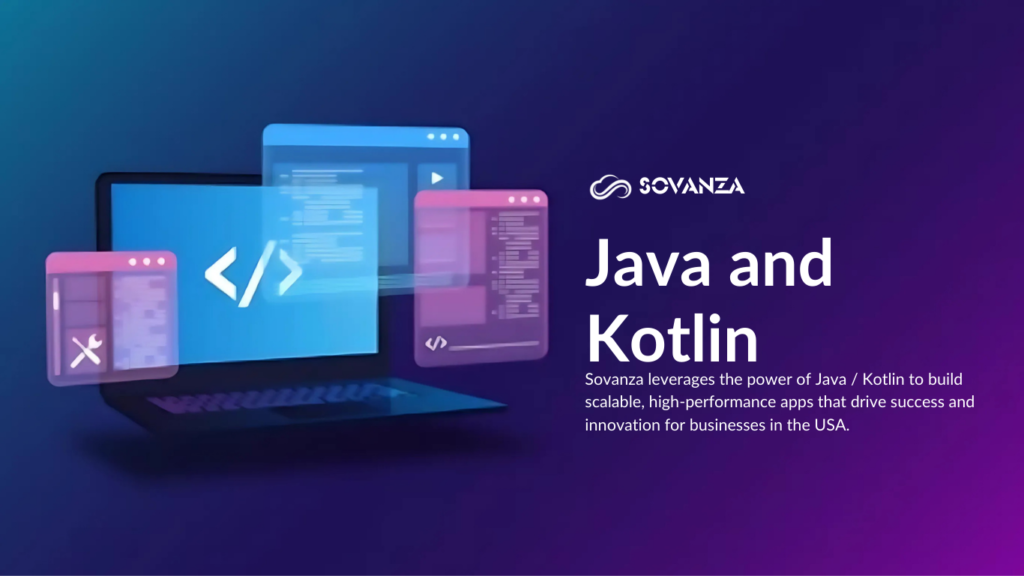
Introduction
Java / Kotlin are the two most popular programming languages for creating Android apps. As technology advances, developers must decide which is ideal for their apps, given that both have advantages. While Kotlin is a contemporary and simple programming language that improves productivity and app speed, Java, a long-time industry standard, provides scalability and stability. Every language offers advantages, and the decision ultimately comes down to the particular requirements of your business and project.
At Sovanza, we are experts in developing Java/Kotlin mobile apps in the USA. We produce scalable, high-performing apps customized to meet your company’s requirements. Our skilled developers use the strengths of both languages to produce solutions that are safe, effective, and prepared for the future. We guarantee that your solution satisfies the highest industry standards, whether creating brand-new software from the ground up or updating an old one.
Sovanza is here to assist you in selecting the best strategy for your app development in the USA, regardless of whether you are a startup or an established business. By providing timely, secure, and reasonably priced solutions that promote business expansion, we put the needs of our clients first. Our extensive knowledge enables your company to maintain its lead in the quickly changing digital market.
.What is Java?
Java is a powerful, object-oriented, high-level programming language that can create programs for various platforms. It was developed by James Gosling at Sun Microsystems and released in 1995. A feature of Java called Write Once, Run Anywhere (WORA) enables Java programs to run on any device with a Java Virtual Machine (JVM).
Key Features of Java
Java is a flexible option for scalable and safe applications because of its essential properties, which include multithreading, strong security, and platform independence.
- Object-oriented: Java implements the OOP model to enhance code structure and reusability. It also allows for inheritance, variation, and encapsulation for effective development.
- Platform-Independent: Java’s “Write Once, Run Anywhere” (WORA) concept guarantees platform compatibility, allowing bytecode to execute on any JVM machine.
- Strong and Safe: Java offers security through memory management, error handling, and bytecode validation. Automatic garbage collection prevents memory leaks.
- Multi-threaded & High Efficiency: Java’s multithreading capability facilitates simultaneous processing. JIT compilation accelerates the process by transforming bytecode into machine code while the program is running.
What is Kotlin?
Kotlin was initially released by JetBrains in 2011, and after Google recognized it as an official language for Android development in 2017, it surged in popularity. Kotlin seeks to address Java’s weaknesses while maintaining compatibility.
Features of Kotlin
With features like null safety, extension functions, coroutines, and smart casts for effective development, Kotlin is a contemporary, succinct, and secure language.
- Null Safety: Avoids null pointer exceptions by defaulting variables to non-nullable, improving the code’s reliability and stability. It decreases runtime failures and removes the necessity for excessive null validation.
- Extension Functions: enhance the capabilities of existing classes without altering their source code, thus increasing flexibility and clarity. They enable developers to effortlessly extend classes that are either third-party or built-in.
- Routers: facilitate effective asynchronous coding without interrupting the main thread, improving performance and responsiveness.
Java/Kotlin: Key Differences
Java is traditional and widely used, while Kotlin is modern, concise, and safer. It has built-in null safety and coroutine support, making development more efficient.
| Aspect | Java | Kotlin |
| Code Verbosity | Increased code lines, tougher to manage | Concise syntax minimizes repetitive code. |
| Functional Programming | requires minimal support and some workarounds. | Robust backing for functional programming. |
Android Development | Favored, enhances productivity and performance. | Favoured, enhances productivity and performance. |
Benefits of Using Java/Kotlin for Businesses
Java/Kotlin languages provide dependability, scalability, and effectiveness, making them suitable for business applications. Their robust community backing guarantees ongoing updates and enhancements.
Enhanced Developer Output
Java /Kotlin both allow developers to create high-quality applications swiftly and effectively. Kotlin’s minimized boilerplate code allows developers to concentrate more on crafting business logic and less on tedious tasks. Java’s vast libraries and tools make it a preferred choice for large-scale systems.
Affordable and Expandable Solutions
Java / Kotlin are budget-friendly options for companies aiming to expand. With many talented developers, both languages can be supported and improved continuously without considerable overhead.
Reliable & Strong Applications
Java/Kotlin comes with integrated features that promote secure coding techniques and reduce the likelihood of typical vulnerabilities. They are outstanding options for companies needing secure, dependable applications.
Why Choose Sovanza for Java/Kotlin Development?
Sovanza is one of the USA’s best mobile app development companies for Java/Kotlin development. It provides safe, scalable, and high-performing applications suited to corporate requirements. Thanks to a team of skilled developers and a dedication to innovation, Sovanza guarantees state-of-the-art solutions that promote user engagement and business growth.
Expertise in Java & Kotlin
Sovanza boasts a group of experienced developers adept in Java/Kotlin, which are the top two programming languages for Android development. With considerable expertise in developing both native and cross-platform applications, we guarantee that your project adheres to the most current industry standards. Our developers stay up-to-date with the latest tools and frameworks to ensure high-performance apps that deliver exceptional user experiences. We take pride in delivering tailored solutions
Performance-Optimized Apps
Our team develops clear, efficient, well-organized code to guarantee seamless operation, minimal memory usage, and improved security. We concentrate on developing extremely responsive and scalable Java/Kotlin applications. Leveraging our expertise, we provide smooth user experiences on all devices. Additionally, we ensure that every app is optimized for fast load times and seamless functionality, enhancing performance and user satisfaction. By utilizing the latest best practices, Sovanza ensures that your app performs at its best, no matter the complexity.
Reliable Java/Kotlin Development in the USA
Sovanza has effectively provided tailored Java/Kotlin applications for companies throughout the USA. We recognize the distinct needs of US companies and offer affordable, prompt, and high-quality services. Our team works closely with clients to ensure their unique requirements are met, delivering custom solutions that drive business success. With a focus on scalability and performance, Sovanza guarantees that every project is optimized for growth. Whether launching a new app or enhancing an existing one, Sovanza ensures seamless integration and efficient development from start to finish.
Future of Java & Kotlin with Sovanza
Sovanza is recognized as one of the USA’s leading mobile app development companies, focusing on Java/Kotlin development. It provides secure, scalable, and high-performing applications customized for business requirements. Through skilled developers and a dedication to innovation, Sovanza guarantees advanced solutions that improve user engagement and promote business growth.
Java/Kotlin in the Era of AI and Machine Learning
Java/Kotlin are advancing with a significant emphasis on AI and machine learning, making them crucial for contemporary app development. Kotlin’s brief syntax and contemporary capabilities make it perfect for AI-focused applications, whereas Java’s strong libraries and frameworks guarantee its ongoing importance in AI advancement. Sovanza utilizes both languages to create intelligent, future-ready applications.
Emerging Trends and Tools for Java/Kotlin Developers
The emergence of cloud computing, microservices, and serverless architectures is influencing the future of Java/Kotlin. As tools and frameworks develop, Sovanza guarantees that developers remain at the forefront with state-of-the-art solutions, incorporating scalability, security, and innovation into each project.
Conclusion
In conclusion, Java/Kotlin provides distinct benefits for developing mobile applications. Java is a classic, dependable selection for large-scale systems, while Kotlin is becoming the contemporary, effective alternative, especially preferred for Android development. The decision regarding these languages mainly relies on your project requirements, business objectives, and team skills.
At Sovanza, we provide tailored professional development services in Java/Kotlin to suit your requirements. Our expert development team creates high-quality, scalable, and secure mobile applications that drive success in the competitive US market. Sovanza is here to assist you in leveraging Java/Kotlin’s complete potential, whether you are developing your initial mobile app or enhancing an existing one. Let’s develop innovative, state-of-the-art solutions that exceed your expectations and fulfill your business goals. Contact us today at Sovanza to start your next project! Reach out via our website or call us for a personalized consultation.
FAQS
Is Kotlin replacing Java?
No, Kotlin is the preferred language for Android development and is not a replacement for Java. Backend and enterprise applications continue to use Java extensively.
Which is better for beginners: Java or Kotlin?
Because of its simple syntax, Kotlin is simpler for novices, while Java offers more learning materials. Kotlin’s concise code also reduces the likelihood of errors, making it a more efficient choice for rapid development.
Can I use Java and Kotlin together?
Yes! Kotlin is fully interoperable with Java, meaning you can use both in the same project. This seamless compatibility allows developers to integrate Kotlin into existing Java codebases without major issues, enabling a smooth transition and leveraging both languages’ strengths.
Is Kotlin only for Android development?
Kotlin can also be used for web and backend development, especially with frameworks like Ktor and Spring Boot. This versatility allows developers to build full-stack applications using Kotlin, streamlining the development process and maintaining consistency across the project.
Which language offers better job opportunities?
Java has broader job opportunities in enterprise software, while Kotlin is highly in demand for Android development. However, Kotlin’s growing popularity is also expanding its presence in other fields, including web development and data science, making it a versatile choice for developers.

